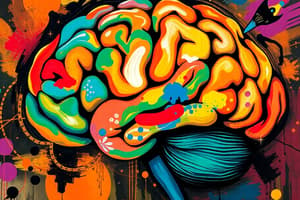Podcast
Questions and Answers
What type of memory is characterized by the need to consciously recall specific information?
What type of memory is characterized by the need to consciously recall specific information?
- Nondeclarative memory
- Habitual memory
- Implicit memory
- Explicit memory (correct)
Which part of the brain is primarily involved in long-term memory storage?
Which part of the brain is primarily involved in long-term memory storage?
- Parietal lobes
- Temporal lobe (correct)
- Cerebellum
- Frontal lobes
What is primarily affected in episodic amnesia?
What is primarily affected in episodic amnesia?
- The ability to form new memories
- The recall of personal experiences (correct)
- The recognition of familiar faces
- The understanding of language
Which of the following correctly defines implicit memory?
Which of the following correctly defines implicit memory?
Which of the following is considered a form of implicit learning?
Which of the following is considered a form of implicit learning?
What type of memory involves the knowledge of how to perform tasks or skills?
What type of memory involves the knowledge of how to perform tasks or skills?
Which of the following statements about short-term memory is true?
Which of the following statements about short-term memory is true?
What is episodic memory specifically associated with?
What is episodic memory specifically associated with?
What type of memory is concerned with personal, autobiographical events?
What type of memory is concerned with personal, autobiographical events?
Which area of the brain is primarily associated with emotional memory?
Which area of the brain is primarily associated with emotional memory?
What happens to the hippocampus in species that excel at spatial memory?
What happens to the hippocampus in species that excel at spatial memory?
The left temporal cortex removal primarily leads to deficits in which of the following?
The left temporal cortex removal primarily leads to deficits in which of the following?
What role does the cerebellum play in memory?
What role does the cerebellum play in memory?
Which hemisphere of the brain is more engaged in episodic information retrieval?
Which hemisphere of the brain is more engaged in episodic information retrieval?
Inferring spatial memory can be linked to what characteristic in the hippocampus?
Inferring spatial memory can be linked to what characteristic in the hippocampus?
Damage to which brain area may disrupt the ability to recognize familiar faces?
Damage to which brain area may disrupt the ability to recognize familiar faces?
What is the primary principle of operant conditioning as described by Thorndike?
What is the primary principle of operant conditioning as described by Thorndike?
In Thorndike's Puzzle Box experiment, what did the cat learn over time?
In Thorndike's Puzzle Box experiment, what did the cat learn over time?
What does implicit memory refer to?
What does implicit memory refer to?
How is explicit memory characterized?
How is explicit memory characterized?
Which type of memory would be lost in a person suffering from amnesia?
Which type of memory would be lost in a person suffering from amnesia?
What does procedural memory involve?
What does procedural memory involve?
Which statement about memory systems is correct?
Which statement about memory systems is correct?
What distinguishes declarative memory from procedural memory?
What distinguishes declarative memory from procedural memory?
What is the first key process in memory?
What is the first key process in memory?
Which level of processing emphasizes the meaning of the information?
Which level of processing emphasizes the meaning of the information?
What does elaboration in encoding refer to?
What does elaboration in encoding refer to?
What are the two temporary storage buffers in the information-processing model?
What are the two temporary storage buffers in the information-processing model?
What characterizes sensory memory?
What characterizes sensory memory?
Which of the following factors can lead to greater recall of information?
Which of the following factors can lead to greater recall of information?
What is the effect of deeper levels of processing on memory retention?
What is the effect of deeper levels of processing on memory retention?
What type of attention emphasizes focusing awareness on a narrow range of stimuli?
What type of attention emphasizes focusing awareness on a narrow range of stimuli?
What is the primary cause of anterograde amnesia?
What is the primary cause of anterograde amnesia?
Which type of amnesia involves loss of memory from before an event?
Which type of amnesia involves loss of memory from before an event?
What factor is NOT a reason for forgetting according to the provided content?
What factor is NOT a reason for forgetting according to the provided content?
Which strategy may help reduce forgetting?
Which strategy may help reduce forgetting?
What is a hallmark of fugue state amnesia?
What is a hallmark of fugue state amnesia?
What is the primary function of short-term memory?
What is the primary function of short-term memory?
What does chunking in memory refer to?
What does chunking in memory refer to?
How is long-term memory organized?
How is long-term memory organized?
What is the main challenge associated with the misinformation effect?
What is the main challenge associated with the misinformation effect?
What component of working memory is responsible for manipulating visual information?
What component of working memory is responsible for manipulating visual information?
What phenomenon describes the difficulty of remembering the source of a memory?
What phenomenon describes the difficulty of remembering the source of a memory?
Which statement about short-term memory is false?
Which statement about short-term memory is false?
What type of amnesia results in the loss of the ability to learn new information?
What type of amnesia results in the loss of the ability to learn new information?
Flashcards
Operant Conditioning
Operant Conditioning
A learning process where consequences of a behavior influence its future probability.
Instrumental Conditioning
Instrumental Conditioning
Another name for operant conditioning.
Thorndike's Puzzle Box
Thorndike's Puzzle Box
An experiment illustrating how consequences affect animal behavior, leading to gradual learning.
Implicit Memory
Implicit Memory
Signup and view all the flashcards
Explicit Memory
Explicit Memory
Signup and view all the flashcards
Declarative Memory
Declarative Memory
Signup and view all the flashcards
Procedural Memory
Procedural Memory
Signup and view all the flashcards
Amnesia
Amnesia
Signup and view all the flashcards
Multiple Memory Systems
Multiple Memory Systems
Signup and view all the flashcards
Explicit Memory
Explicit Memory
Signup and view all the flashcards
Implicit Memory
Implicit Memory
Signup and view all the flashcards
Declarative Memory
Declarative Memory
Signup and view all the flashcards
Nondeclarative Memory
Nondeclarative Memory
Signup and view all the flashcards
Short-term Memory
Short-term Memory
Signup and view all the flashcards
Long-term Memory
Long-term Memory
Signup and view all the flashcards
Episodic Memory
Episodic Memory
Signup and view all the flashcards
Episodic Amnesia
Episodic Amnesia
Signup and view all the flashcards
Sensory Modalities
Sensory Modalities
Signup and view all the flashcards
Pavlovian conditioning
Pavlovian conditioning
Signup and view all the flashcards
Thorndike’s and Skinner’s operant learning
Thorndike’s and Skinner’s operant learning
Signup and view all the flashcards
Explicit Memory
Explicit Memory
Signup and view all the flashcards
Episodic Memory
Episodic Memory
Signup and view all the flashcards
Semantic Memory
Semantic Memory
Signup and view all the flashcards
Hippocampus
Hippocampus
Signup and view all the flashcards
Spatial Memory
Spatial Memory
Signup and view all the flashcards
Implicit Memory
Implicit Memory
Signup and view all the flashcards
Cerebellum
Cerebellum
Signup and view all the flashcards
Basal Ganglia
Basal Ganglia
Signup and view all the flashcards
Amygdala
Amygdala
Signup and view all the flashcards
Emotional Memory
Emotional Memory
Signup and view all the flashcards
Hemispheric Encoding-Retrieval asymmetry
Hemispheric Encoding-Retrieval asymmetry
Signup and view all the flashcards
Right Temporal Cortex
Right Temporal Cortex
Signup and view all the flashcards
Left Temporal Cortex
Left Temporal Cortex
Signup and view all the flashcards
Parietal/Occipital Cortex
Parietal/Occipital Cortex
Signup and view all the flashcards
Anterograde Amnesia
Anterograde Amnesia
Signup and view all the flashcards
Retrograde Amnesia
Retrograde Amnesia
Signup and view all the flashcards
Childhood Amnesia
Childhood Amnesia
Signup and view all the flashcards
Fugue State
Fugue State
Signup and view all the flashcards
Forgetting Curve
Forgetting Curve
Signup and view all the flashcards
Ineffective Encoding
Ineffective Encoding
Signup and view all the flashcards
Memory Decay
Memory Decay
Signup and view all the flashcards
Interference (Forgetting)
Interference (Forgetting)
Signup and view all the flashcards
Retrieval Failure
Retrieval Failure
Signup and view all the flashcards
Motivated Forgetting
Motivated Forgetting
Signup and view all the flashcards
Encoding
Encoding
Signup and view all the flashcards
Storage
Storage
Signup and view all the flashcards
Retrieval
Retrieval
Signup and view all the flashcards
Attention
Attention
Signup and view all the flashcards
Selective Attention
Selective Attention
Signup and view all the flashcards
Levels of Processing Theory
Levels of Processing Theory
Signup and view all the flashcards
Structural Encoding
Structural Encoding
Signup and view all the flashcards
Phonemic Encoding
Phonemic Encoding
Signup and view all the flashcards
Semantic Encoding
Semantic Encoding
Signup and view all the flashcards
Elaboration
Elaboration
Signup and view all the flashcards
Visual Imagery
Visual Imagery
Signup and view all the flashcards
Self-Referent Encoding
Self-Referent Encoding
Signup and view all the flashcards
Sensory Memory
Sensory Memory
Signup and view all the flashcards
Sensory Register
Sensory Register
Signup and view all the flashcards
Short-Term Memory (STM)
Short-Term Memory (STM)
Signup and view all the flashcards
Chunking
Chunking
Signup and view all the flashcards
Long-Term Memory (LTM)
Long-Term Memory (LTM)
Signup and view all the flashcards
Clustering
Clustering
Signup and view all the flashcards
Schemas
Schemas
Signup and view all the flashcards
Semantic Networks
Semantic Networks
Signup and view all the flashcards
Retrieval Cue
Retrieval Cue
Signup and view all the flashcards
Context Cues
Context Cues
Signup and view all the flashcards
Working Memory (WM)
Working Memory (WM)
Signup and view all the flashcards
Central Executive
Central Executive
Signup and view all the flashcards
Phonological Loop
Phonological Loop
Signup and view all the flashcards
Visuospatial Sketchpad
Visuospatial Sketchpad
Signup and view all the flashcards
Episodic Buffer
Episodic Buffer
Signup and view all the flashcards
Misinformation Effect
Misinformation Effect
Signup and view all the flashcards
Source Monitoring
Source Monitoring
Signup and view all the flashcards
Source Monitoring Error
Source Monitoring Error
Signup and view all the flashcards



